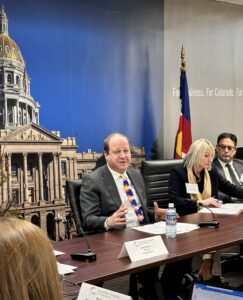While Colorado employers’ biggest concerns revolve around the increasing regulations on their operations, the shortage of available workers ranks a solid second, according to results of a survey that come as the state government attempts to deal with similar labor issues.
Eleven percent of companies identified the worker shortage as their most important issue in a survey done in June and July for the Colorado Chamber of Commerce by national research firm Cole Hargrave Snodgrass & Associates. That’s significantly lower than the 27% of respondents that pegged the issue of too few workers as their top concern last year, but it is still a significant challenge — and is particularly acute for employers operating primarily in the Denver area, the survey found.
According to state figures, Colorado has more than two job openings for every unemployed resident of the state. Businesses have had to limit operating hours, pause expansions and take other steps that have cut into their productivity as they have dealt for several years now with this worker shortage.
State government is reeling from the effect of too few workers as well, with the Denver Post reporting last month that one in five state jobs is vacant. On Thursday, Gov. Jared Polis issued an executive order requiring his agency heads to boost the number of registered apprenticeship programs 50% by June to help stock divisions with high vacancy rates — and encouraging private employers to explore how work-based learning opportunities could address their talent-development needs.
Survey results on worker shortage
The Colorado Chamber survey found that 48% of Colorado businesses have openings that they have had difficulty trying to fill. That number is down from 66% one year ago, but it appears to be weighing on companies’ decisions about whether to grow.
Just 41% of the 156 business-owner respondents said that they plan to increase workforce this year, down from 48% in 2022. CHS & Associates President Pat McFerron, who has done similar surveys in about a dozen states, noted that the number of Colorado firms looking to grow in this still-hot economy is lower than he’s seeing elsewhere, and he argued that should be a cause of concern to state leaders.
“Business leaders tend to be optimists, or they don’t usually enter into business,” McFerron said during a conference call to announce the results of the survey. “So, when we see that number come down to 41, that is significant.”
A talent disconnect and recruitment issues
Employers also expressed some concern in the survey with the quality of applicants they are getting for jobs, with just 13% assessing the workforce as “very satisfactory” — down five points from 2022 — and another 58% calling it “somewhat satisfactory.”
The largest plurality of respondents — 30% — cited a lack of talent as the main reason they did not rank the workforce more highly. In another question, 33% said the lack of technical skills was their greatest concern with the workforce’s talent, while 29% cited a lack of durable or “soft” skills such as problem-solving and communication.
Meanwhile, two barriers stand out particularly as the biggest impediments to attracting and retaining the talent that employers want. The high cost of living and the lack of attainable housing both earned citations from more than half of survey respondents as one of the top two things that makes it more difficult to reel in and keep valuable staffers.

Kreg Brown is a partner with Plante Moran and chairman of the Colorado Chamber of Commerce board of directors.
Kreg Brown, a partner with Plante Moran and chairman of the Colorado Chamber board, moved to Denver from St. Louis in 1998 and expected he would be able to recruit other workers from the Midwest in addition to hiring Colorado residents. But in the past five years, he’s found it hard to recruit employees from the Great Lakes area where Plante Moran is headquartered because the cost of living is so high that a Denver relocation is less attractive to them, he said.
Private and public employers attempting fixes
His firm is trying new strategies, including expansion of its apprenticeship program and efforts to work more closely with college accounting programs to recruit graduates, Brown said. But the impediments to recruiting and retaining workers here has stopped Plante Moran from growing as large as it can be in Colorado.
“I think if we could get everyone we want, we could double our staff,” Brown said of the worker shortage.
Polis too has recognized the gaps in the state’s talent-development pipeline and has made several efforts in recent years to increase employer use of apprenticeships, believing such work-based learning opportunities create more on-ramps to careers and diversify talent pools. Just since 2021, the Democrat has signed bills establishing the State Apprenticeship Agency and boosting support for high schoolers to explore apprenticeships and has issued an executive order directing state agencies to develop registered apprenticeship programs.

Gov. Jared Polis speaks to a Colorado Chamber of Commerce board meeting earlier this year about his legislative agenda. Polis has taken several actions to alleviate a worker shortage.
The efforts so far have helped generate more than 300 active apprenticeship programs in the state serving more than 6,000 participants, the governor said.
Executive order on worker shortage
On Thursday, Polis issued a new executive order to state officials to identify areas of high-demand jobs in which work-based learning opportunities could help to fill open positions, to identify challenges to this strategy and to develop plans to address obstacles. It also expanded his 2022 order on developing apprenticeship programs to promote other work-based learning, including internships, pre-apprenticeships and fellowships.
The order limits specific requirements to state agencies: Increase registered apprenticeship programs in state government 50% by June 2024; create 10 new work-based learning programs for classifications with high vacancy rates by June 2025; develop a program to recruit secondary-school graduates to public-service opportunities through such learning programs.
But it also directs those state agencies to work with the private sector in hopes of creating an additional 100 apprenticeship programs across the state by June, in part by having the Office of Economic Development and International Trade educate employers about two existing incentive programs for work-based learning opportunities. And it offers a call to action for private employers to work with agencies like the Colorado Department of Labor and Employment to undertake the same exploration and expansion of activities as the state.
“I encourage private employers in the state to reach out to the CDLE to connect with resources and explore how apprenticeships and other work-based learning opportunities may address their talent-development needs,” Polis wrote. “I encourage private employers to collaborate with their local education providers and institutions of higher education to create high quality work-based learning opportunities geared toward skilled, good-paying jobs.”
